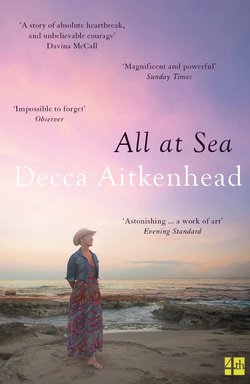Читать книгу All at Sea - Decca Aitkenhead, Decca Aitkenhead - Страница 6
prologue
ОглавлениеThe thing to remember about this story is that every word is true. If I never told it to a soul, and this book did not exist, it would not cease to be true. I don’t mind at all if you forget this. The important thing is that I don’t.
My three-year-old son asks me to tell him the story almost every day. ‘Tell me the story about how Tony died-ed again,’ he says. And so I do, until he knows the words and can join in, as if it were a well-worn nursery rhyme. He needs to hear the story to make it real for him. But the ritual makes it sound more like Little Red Riding Hood to me – just another fantastical fairy tale.
The first time I read the story of Tony’s death, it was a news report in the Guardian, my own newspaper. I love newspapers. I have been a journalist for twenty years. Even as a child I was a compulsive writer, but only ever of diaries, letters, lists – never fiction. Where would be the point in making up a story, when the truth is by definition always more interesting? And so for twenty years I have been reading and writing what I thought of as the truth. Then I read about my own family’s tragedy in my newspaper, and the only thing I could think was: they can’t be talking about me. They can’t mean my family. This could never happen to me and my family. This is something that happens to other people.
‘This happens to other people’ is a recurring cliché of the random tragedy survivor’s experience. I have heard it countless times in my job, from stunned interviewees recounting a bolt from the blue – and to tell the truth, I have always found it puzzling. What do they mean? Why would they imagine that other people are any different from them? Now here I was, thinking exactly the same thing: this happens to other people. And slowly, I began to see why.
We read about freak disasters every day, knowing perfectly well that the news is not fiction. And yet, deep down, what we are reading must feel to us made up. Why else would we be so incredulous when they happen to us? Even the journalists who report them must be in the same boat. I have been writing about real people for all these years, and apparently had not grasped that they were real.
Back in the early Nineties, among a particular type of London media sophisticate, something called postmodernism was the height of fashion, and dinner parties would routinely be ruined by some cultural studies graduate boring everyone to death about the absurdity of constructs such as ‘truth’. At the time I wrote it off as a fad for pseudo-intellectuals hoping to look clever. Now I wonder if they weren’t onto something after all.
Because it isn’t really possible to write about a real-life event without turning it into a form of fiction. Once an accident of chance has been organised into a narrative, it can be honest, and accurate, and illuminating. But it is only an edited version of a partial perspective, not the same thing as the truth.
So now I am afraid that by writing this story, I will make it untrue. Chapter headings and syntax and punctuation will elbow all my tears and grief out of the way, until the catastrophe has been reduced to just another piece of work, and my memories of what happened have been replaced by this printed version, creating a safe distance between myself and the horror.
Of course, in many ways this is enormously appealing. If I take control of this narrative and become its author, I will steal its power over me; I can detach myself from my own story, and escape. Who wouldn’t want to do that? And yet, that is also the very thing I fear most.
For most of my life I have known how to control my feelings. I found that if you can control your feelings, you can pretty much control your whole world. It’s amazingly effective. But Tony’s death was beyond my control – and now, for the first time, so are my emotions. Tony always used to tell me to think less and feel more, but I never could. Now that that’s all I can do, I can see he was right – and if feelings are his gift from the grave, I’m afraid of taming them into words.
But if I don’t write about him, I am afraid I will forget too much. I was almost ten years old when my mother died, and I can remember someone telling me at the time to write down all my memories of her. What a daft idea, I remember thinking. Where would be the point? I’m hardly likely to forget anything about her. I remember all that very clearly. Unfortunately, however, within a remarkably short time I found I had forgotten almost everything else. She had been my mother for one week short of a decade, and before I was even in my teens I could barely remember a thing about her. I lost most of a decade of my life.
Tony drowned just a few months before our tenth anniversary, and I am frightened of losing that decade too. So I write because I don’t want to forget.
